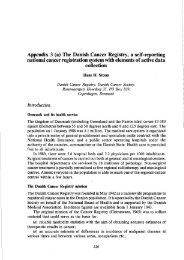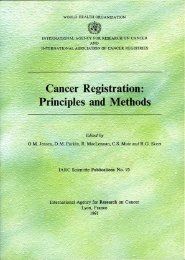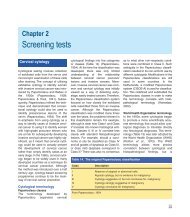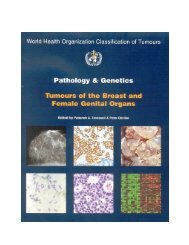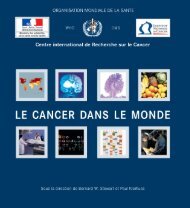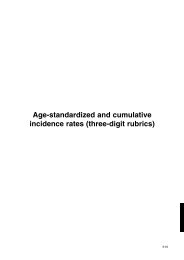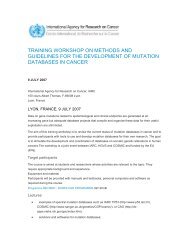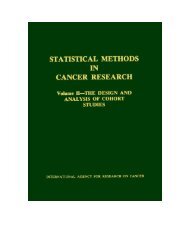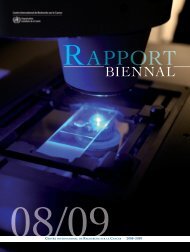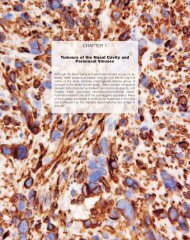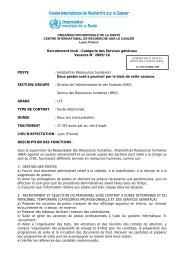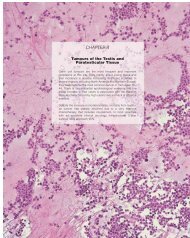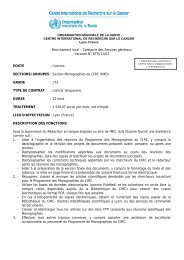world cancer report - iarc
world cancer report - iarc
world cancer report - iarc
Create successful ePaper yourself
Turn your PDF publications into a flip-book with our unique Google optimized e-Paper software.
Fig. 5.134 Ten-year relative survival for melanoma,<br />
according to stage.<br />
nique enables mapping of the lymphatics<br />
in the skin by lymphoscintigraphy:<br />
radioactive tracer is injected at the site of<br />
the primary and its flow through the skin<br />
to the first lymph node that takes up the<br />
REFERENCES<br />
1. Ferlay J, Bray F, Parkin DM, Pisani P (2001) Globocan<br />
2000: Cancer Incidence and Mortality Worldwide (IARC<br />
Cancer Bases No. 5), Lyon, IARCPress.<br />
2. IARC (1992) Solar and Ultraviolet Radiation (IARC<br />
Monographs on the Evaluation of Carcinogenic Risks to<br />
Humans, Vol. 55), Lyon, IARCPress.<br />
3. Aitken JF, Duffy DL, Green A, Youl P, MacLennan R,<br />
Martin NG (1994) Heterogeneity of melanoma risk in families<br />
of melanoma patients. Am J Epidemiol, 140: 961-973.<br />
4. Steiner A, Pehamberger H, Wolff K (1987) In vivo epiluminescence<br />
microscopy of pigmented skin lesions. II.<br />
Diagnosis of small pigmented skin lesions and early detection<br />
of malignant melanoma. J Am Acad Dermatol, 17: 584-<br />
591.<br />
5. Schaffer JV, Bolognia JL (2001) The melanocortin-1<br />
receptor: red hair and beyond. Arch Dermatol, 137: 1477-<br />
1485.<br />
6. Pollock PM, Trent JM (2000) The genetics of cutaneous<br />
melanoma. Clin Lab Med, 20: 667-690.<br />
7. Goldstein AM, Chidambaram A, Halpern A, Holly EA,<br />
Guerry ID, Sagebiel R, Elder DE, Tucker MA (2002) Rarity of<br />
CDK4 germline mutations in familial melanoma. Melanoma<br />
Res, 12: 51-55.<br />
256 Human <strong>cancer</strong>s by organ site<br />
tracer (the sentinel node) is identified.<br />
This lymph node is then removed for<br />
histopathological examination; only patients<br />
with positive lymph nodes are subjected<br />
to full lymph node dissection.<br />
However, pending completion of an international<br />
trial, the survival benefit of this<br />
technique is unknown.<br />
Metastatic melanoma<br />
The greater the number of nodes involved,<br />
the higher the risk of systemic metastases<br />
and poor prognosis. As the thickness of the<br />
melanoma increases and as the number of<br />
lymph nodes involved rises, the risk of systemic<br />
metastases becomes greater.<br />
Melanoma metastasizes widely, with the<br />
lungs, liver and brain being the most common<br />
sites. Vitiligo (a skin condition characterized<br />
by failure to form melanin) is a<br />
favourable prognostic sign in metastatic<br />
melanoma. At the present time, only a small<br />
8. Halachmi S, Gilchrest BA (2001) Update on genetic<br />
events in the pathogenesis of melanoma. Curr Opin Oncol,<br />
13: 129-136.<br />
9. Davies H, Bignell GR, Cox C, Stephens P, Edkins S et<br />
al. (2002) Mutations of the BRAF gene in human <strong>cancer</strong>.<br />
Nature, 417: 949-954.<br />
10. National Health and Medical Research Council, ed.<br />
(1999) Clinical Practice Guidelines. The Management of<br />
Cutaneous Melanoma.<br />
11. Morton DL (2001) Lymphatic mapping and sentinel<br />
lymphadenectomy for melanoma: past, present and future.<br />
Ann Surg Oncol, 8: 22S-28S.<br />
12. Coates AS (1992) Systemic chemotherapy for malignant<br />
melanoma. World J Surg, 16: 277-281.<br />
13. Helmbach H, Rossmann E, Kern MA, Schadendorf D<br />
(2001) Drug-resistance in human melanoma. Int J Cancer,<br />
93: 617-622.<br />
14. Weber JS, Aparicio A (2001) Novel immunologic<br />
approaches to the management of malignant melanoma.<br />
Curr Opin Oncol, 13: 124-128.<br />
15. Hersey P (2002) Advances in the non-surgical treatment<br />
of melanoma. Expert Opin Investig Drugs, 11: 75-85.<br />
proportion of people (



